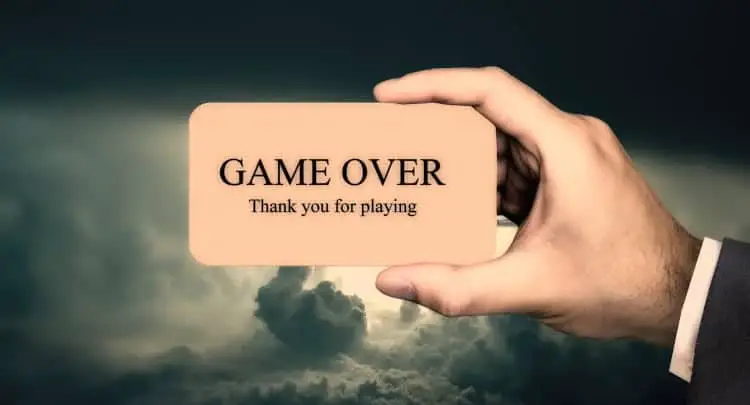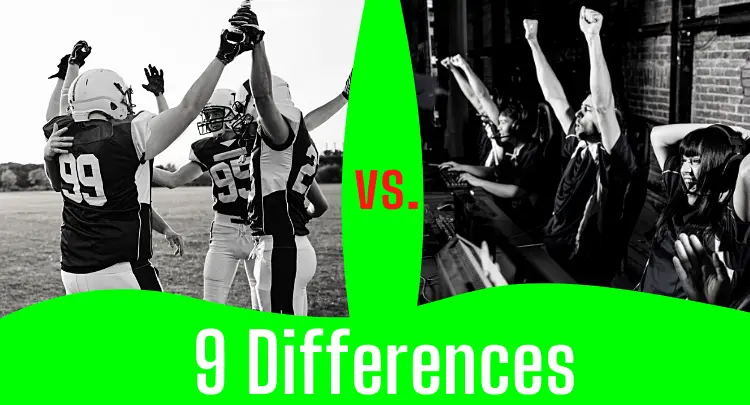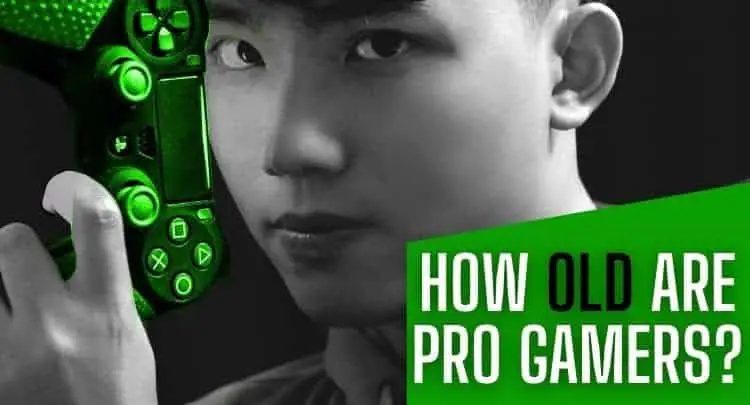When I talk about sports, matches in PUBG, Valorant, or CSGO already belong to it. SimRacing and virtual sports games like FIFA have also made me forget that Esports isn’t even Olympic yet. I’ve built two semi-professional Esports organizations in the last 20 years. From my experiences, there are not many differences between traditional sports and virtual sports.
In this post, we write about the question: Is Esports a Real Sport? We also describe some of the scientific, psychological, and physical similarities or differences between esport and classic sport.
Electronic sport (esport) has all the characteristics of a traditional sport and is accepted by society and science as a sporting activity. Esports will be part of the 2024 Summer Olympics in France, and digital athletes worldwide will compete for glory.
First of all, let’s start with a definition of sport from the traditional perspective. We call a sport a competitive activity in which people of different ages, living in different countries, are playing with different goals and rules. In a sport, there is always a winner and a loser. The winner gets to celebrate his achievement after winning the game or event or competition while the loser is disappointed about not winning.
Note: This article was written in English. Translations into other languages may not provide the same linguistic quality. We apologize for grammatical and semantic errors.
In some sports, such as athletics or tennis, some awards are given for showing excellence in these areas that are judged by other athletes from around the world by public votes. Furthermore, most sports have stadiums to watch the competitions and events either locally or on TV/Internet.
The Cambridge Dictionary definition for the noun sport is A game, competition, or activity needing physical effort and skill played or done according to rules, enjoyment, or job.
There is also a definition for electronic sport (esport) in the same dictionary: the activity of playing computer games against other people on the internet, often for money, and constantly watched by other people using the internet, sometimes at specially organized events.
Esports is not a new trend. But instead, it has been evolving. It is called esports because it brings together digital games and athletes to compete on a high level.
In the beginning, esports was mainly played on regular personal computers or consoles. Still, this has changed into playing on specialized equipment such as gaming PCs, gaming monitors with new technical features, and the cloud through which more and more gamers play their games. Today, we are on the verge of computer games running entirely in the cloud. We show you in this post what cloud gaming is:
The roots of esports lie in classic video games such as Counterstrike: Global Offensive and League of Legends. These older esport games are still very popular today, with millions of viewers per year and tens of thousands at live events.
Nowadays, each esport discipline has its own rules and different types and ways of playing, leading to more fun and entertainment. In this sense, esports is still developing in many directions that are not yet taken by other sports, e.g., ESL Meisterschaft – Germany’s top esports league or multi-game esports leagues such as Intel Extreme Masters held events for StarCraft II, League of Legends, etc.
So, is Esport a real sport? What does science say about this topic? A study called Virtual(ly) Athletes: Where eSports Fit Within the Definition of “Sport” from 2018 states that esports and sports have a lot in common.
But let’s take a deep dive.

What are the Differences Between Classic Sports and Esports?
Esport can be considered a real sport because of different scientific, psychological, and physical reasons. The first one is that the players experience great mental and physiological stress during tournaments and competitions. It also improves their mood simultaneously, and it offers new skill sets that are needed in their respective fields (e.g., strategy). Besides, esports competitors need to use dexterity, eye-hand coordination, and knowledge about tactics to succeed while playing an esport game.
Esports competitions are usually played in broadcast formats. Just like other sports, Esports players need to be trained and developed to perform under pressure. Esports is a young sport, and not all of it is recognized as a real sport yet. However, we can see that scientific research in this field is constantly evolving, and so are many professional esports players.
Another reason for esport being considered a real sport is an equipment that enables them to compete (e.g., headsets, keyboards, gaming mouses). In some ways, esport players share something with professional athletes related to their health, although esports players can play from home on a personal computer rather than on a sports field.
Esports players need to use a lot of energy while playing esport games to eat healthily and keep fit with special training. If you wonder whether pro gamers resort to aids like energy drinks, we recommend reading this post:
Besides, esports tournaments are highly anticipated by the general public, which can be considered an argument for esport being a real sport.
In some ways, esports is similar to classic sports because it requires professional players to have a high-performance level. However, these players have no specific age or gender limitations, and they are not necessarily part of a team. Also, in esports, professional players don’t create their strategies while playing esport games but instead, they make decisions on behalf of their teams. This means that there are also differences between classic sports and esports, which can be considered factors that make live esport tournaments different from other sporting events (e.g., golf tournaments).
Professional esports players have to face different challenges while competing. For example, they may need to manage their emotions to play under pressure and the match’s psychological stress. In this sense, it is said that professional esports players are very much like professional athletes.
In some ways, esport can be defined as a sport because it includes many of a regular sport’s main elements. Some of these elements are strategy, teamwork, and, most importantly, having fun. It is also said that esports is a competitive form of play that involves physical and mental components.
The professionalization of esports has led to creating different tournaments in which they compete across the world to win titles and collect money prizes. Many people believe that esport can become more prominent than other traditional sports during the next decade. In this sense, esports’ growth can be considered a new trend that is rapidly growing.
We’ve focused a bit more on the differences in this post:
Honest recommendation: You have the skill, but your mouse doesn't support your aiming perfectly? Never struggle with your mouse grip again. Masakari and most pros rely on the Logitech G Pro X Superlight. See for yourself with this honest review written by Masakari or check out the technical details on Amazon right now. A gaming mouse that fits you makes a significant difference!
What are the Different Types of Esports?
The number of players of the various Esports titles is enormous. League of Legends (LoL) and Dota 2, for example, are played by over 100 million players, while CS:GO has an active player base of around 30 million.
The current average number of concurrent viewers is 565 million, which means that almost one-fourth of the total population watches some gameplay every day. Viewership is also on the up because games such as CS:GO and League of Legends keep growing in popularity despite facing criticism from the community due to a lack of depth and complexity in their gameplay.
There are several different types of esports. Just like in traditional sports, certain categories have their own specialties and focus. Most notably, FPS esports (First Person Shooter) such as Counterstrike: Global Offensive, PlayerUnknown’s Battlegrounds (PUBG), Call of Duty, Apex Legends, and Rainbow Six Siege stands out for having extremely complex gameplay and a large number of players competing against each other at the same time. These games have attracted gamers who enjoy playing intense games that can be highly competitive and very fast-paced, and fun to watch.
In this post, we take a deeper look at why FPS games are so incredibly popular:
Finally, one can mention sports video games where the most popular titles include NBA, FIFA, and NHL. These games are also highly competitive in the sense they involve many players competing against each other. However, in sports video games, the focus is not on fast-paced action and reaction but strategy and tactics. This means that competition is often a matter of who has better control over the game itself via special abilities or improved team play than pure aiming ability or reflexes.
Currently, there are more than 20 popular esport games that can be played professionally. Each of these games has an official league that is responsible for organizing and promoting the professional scene. Tournaments are also organized to determine who is the strongest player/team after competing against each other in live events throughout the year.
How to Become a Professional Esport Player?
In this sense, it is said that to become a professional esports player (under normal instances), one must be at least 17 years old because money is involved. There are numerous examples of esport careers starting earlier. In the post, we looked at digital athletes’ age:
The path to becoming a professional esports player is similar to that of other sports. One must first practice for many hours to increase his or her level. After reaching a certain level, one can be selected by a team and join them to compete at an amateur level against other teams.
After proving that they can compete at an amateur level, one can join a professional team and begin competing against other professional teams worldwide. In this sense, it is said that esports is very similar to traditional sports in which you need talent and perseverance before becoming a professional. In this post, we have given you an example of how high the probability of an esport career is:
Finally, it is said that there is no doubt that esport is becoming increasingly popular in the world and professionals earn a lot of money as they achieve victory in their competitions. For example, Dota 2 has the highest prize money pool of all esport games, e.g., $24 million for The International 2017 for Dota 2 competition between professional teams.
Conclusion
On closer inspection, there are no longer any differences between traditional analog sports and esports. Esports are becoming more and more attractive because really computer player has the prerequisites to be good at any game. Even if you don’t get into competitive gaming, any gamer can put themselves in the shoes of professional athletes and root for them. At the same time, media coverage is becoming more and more professional. Meanwhile, even non-gamers can relate to the term esport. An entire industry with its ecosystem has built up over the last few decades. Esport is, therefore, the future of sports.
If you have a question about the post or pro gaming in general, write us: contact@raiseyourskillz.com.
If you want to get more exciting information about becoming a pro gamer and what relates to pro gaming, subscribe to our newsletter here.
GL & HF! Flashback out.







